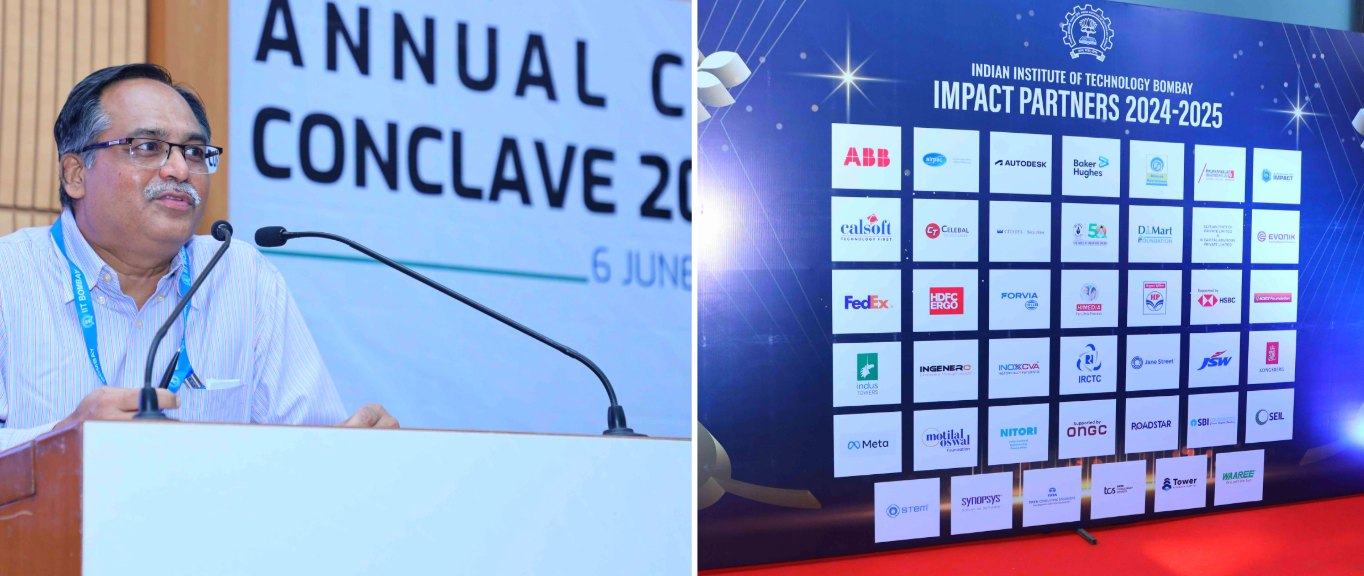IIT Bombay held its annual CSR (Corporate Social Responsibility) Conclave 2025 on June 6, 2025, at its Powai campus. Centred on the theme “Fuelling Technology for Nation Building,” this year’s Conclave brought together over 500-plus attendees (including 230-plus corporate delegates) along with visionary industry pioneers, philanthropic changemakers, academic trailblazers, faculty, and students for a day of dialogue and collaboration.
All of the attendees received the CSR Conclave 2025 brochure, which opens with a powerful message from IIT Bombay’s Director, Prof. Shireesh B. Kedare, reaffirming the Institute’s belief that science and technology are not just engines of economic growth but catalysts for national transformation. Framed around the theme Fuelling Technology for Nation Building, the brochure outlines why IIT Bombay is uniquely positioned to be a trusted CSR partner, with its global reputation, mission-driven research, and proven track record of scalable, tech-enabled impact. It highlights the Institute’s collaborative approach to addressing India’s most pressing challenges—from climate and health to education and digital inclusion—and offers a compelling call to action: to co-create an equitable, innovative, and inclusive future through purposeful partnerships between academia and industry.
The Conclave underscored two powerful ideas defining IIT Bombay’s CSR strategy: (1) meaningful, measurable societal impact underpinned by strong governance, and (2) the development of technology for nation-building.
This spirit of purpose was echoed by a compelling keynote address by Prof. Kedare, who highlighted that with clear engagement pathways, rigorous protocols, and a commitment to transparency, the Institute has built a CSR ecosystem that inspires trust. “Our strong governance framework and robust compliance mechanisms give corporate partners the confidence they seek,” he said. “We’re structured to move with the pace, accountability, and professionalism that CSR collaborations demand.”
The director’s message mirrors the larger momentum IIT Bombay is building through its CSR partnerships. FY 2024–25 was a landmark year as the Institute signed 81 new CSR partnerships. Over 140 companies supported a wide range of initiatives, including building research and academic infrastructure, establishing Centres of Excellence, funding faculty chairs, and setting up student scholarships.
IIT Bombay welcomes new collaborations with companies looking to align their CSR vision with scalable, technology-driven solutions for societal impact. Alumni who wish to connect their organisations’ CSR or ESG leadership with the Institute are encouraged to write to the Institute at corporateconnect@iitbacr.com to explore potential synergies.
Launching the Annual CSR Catalogue 2025
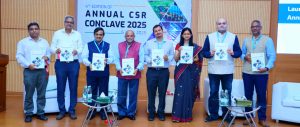
This vision came alive with the unveiling of the Annual CSR Catalogue 2025—a comprehensive showcase of 276 cutting-edge, ready-to-roll projects, which is more than double last year’s output. Spanning sectors such as healthcare, sustainability, education, women’s empowerment, rural development, skill development, social policy, and last-mile delivery, the catalogue offers in-depth insights into ongoing initiatives and partnership opportunities with corporates, fostering greater collaboration, transparency, and long-term impact.
Click here to download the CSR Catalogue 2025.
Chief Guest – Mr. Ashank Desai
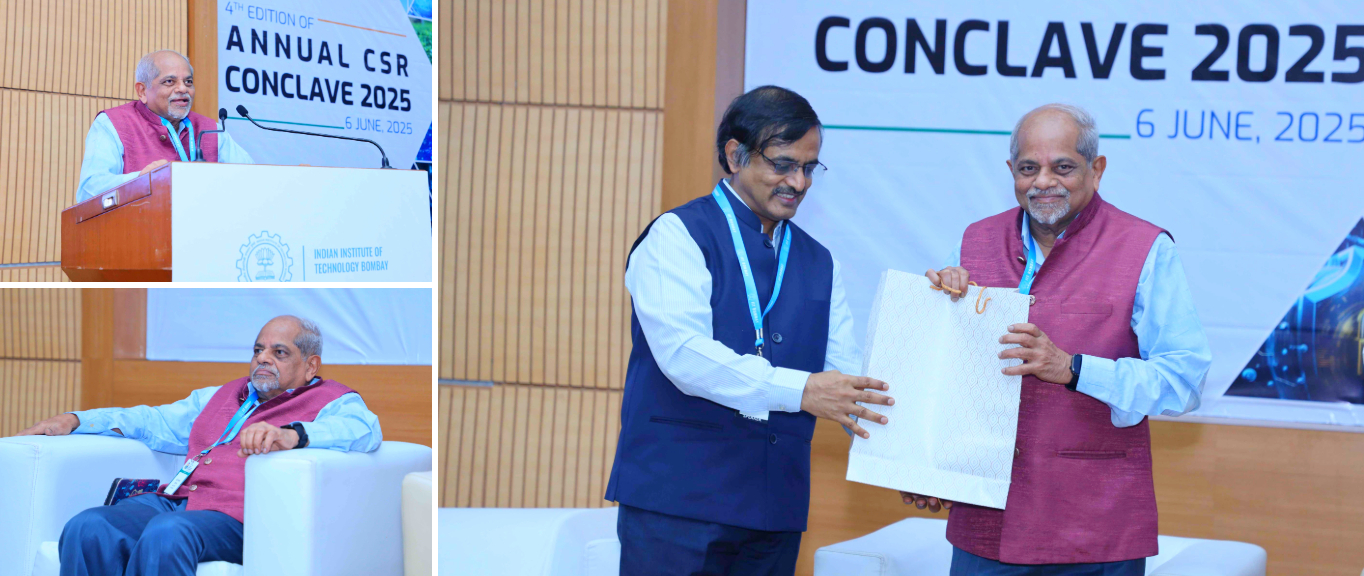
The Chief Guest, Mr. Ashank Desai, tech entrepreneur, philanthropist, and the Institute’s Distinguished Alumnus, delivered a powerful address that framed a bold and urgent vision for the country’s future. “India must lead the global economy in both GDP growth and scientific innovation. That’s how we become a truly developed nation by 2047,” he said. Mr. Desai asserted that the country’s progress hinges not just on innovation, but on how quickly and effectively it translates into real-world impact. “We can’t afford to move in months and years anymore,” he said. “Speed and size of impact—that’s what matters now.”
Mr. Desai called on corporate India to reimagine CSR not as a matter of compliance or charity, but as a long-term investment in India’s scientific ecosystem. “If IIT does well, society benefits—directly or indirectly. That too is giving back,” he noted, encouraging businesses to shift from transactional funding to co-creation models that combine academic research with on-ground implementation. Institutions like IITs offer deep intellectual capital but must collaborate with grassroots organisations, such as NGOs, ASHA workers, and community leaders, to ensure that technology solutions address the complexities of rural India.
Mr. Desai also urged academia to embrace a more problem-centric, interdisciplinary approach to innovation. “Problems don’t come labelled as electrical or mechanical. They just come as problems. And they need all disciplines at the table,” he said, aligning with IIT Bombay’s growing emphasis on multidisciplinary research and the formation of collaborative centres and task forces that connect scientists with policymakers. Reflecting on IIT Bombay’s role, he underscored the need to shape not just talented engineers but socially conscious problem solvers. “We get the best talent in the country. But beyond academics, we must expose students to society’s problems and mentor them to be engineers who make a difference.”
Main Panel Discussion
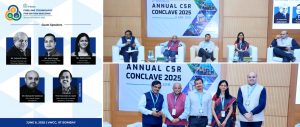
One of the most compelling moments of the day was a high-impact panel discussion on how philanthropic capital can accelerate the journey of innovation from lab to market. The session, titled “From Lab to Market: The Role of Philanthropy in Scientific Innovation,” brought together three of IIT Bombay’s most esteemed alumni, each of whom is a changemaker at the intersection of technology, entrepreneurship, and social impact, alongside a leading figure in the development sector whose work has transformed lives across rural India.
Together, this powerhouse panel explored how mission-aligned giving, strategic partnerships, and long-term ecosystem building can bridge critical funding gaps and deliver transformative scientific outcomes. Moderated by Prof. Ravindra Gudi, Dean, Alumni and Corporate Relations (Dean ACR), the session set the tone for the collaborative, future-focused spirit of the Conclave.
The discussion featured:
Ms. Rekha Koita – IIT Bombay alumna Ms. Rekha Koita (B.Tech., Metallurgical Engineering, 1992), Co-founder of Koita Foundation, is a changemaker at the intersection of technology and social impact. The Foundation empowers NGOs to scale through digital transformation and process optimisation. She also leads Pyramid Plus and teaches at Mind Matters, helping mission-driven organisations build capacity for sustainable growth. In 2019, she received the Distinguished Service Award from IIT Bombay for her contributions.
Mr. Ashank Desai – IITB alumnus and a Distinguished Alumnus Awardee, as well as the Chief Guest of CSR Conclave 2025, Mr. Ashank Desai (M.Tech., Mechanical Engineering, 1974) is the Founder and former Chairman & Managing Director of Mastek Ltd., a pioneering software services company he built into a global enterprise. He helped shape the Indian IT industry as a founding member and is a past Chairman of NASSCOM. He has played a key role in promoting entrepreneurship and business incubation at IIT Bombay through SINE, and continues to be closely involved with the Institute and several national industry bodies.
Mr. Mirik Gogri – Mr. Mirik Gogri (Dual Degree, Metallurgical Engineering & Material Science, 2013) is the visionary behind the Gogri Hub for Membranes Research at IIT Bombay—an initiative accelerating breakthroughs in clean energy, water purification, and healthcare. He leads corporate strategy at Aarti Industries and drives investments in climate-tech and healthcare innovation through Spectrum Impact, with a focus on scaling technologies that create lasting social and environmental impact.
Mr. Maharshi Vaishnav – Mr. Maharshi Vaishnav is the CEO of Motilal Oswal Foundation. He brings over 20 years of experience in strategic planning, programme management, fundraising, and government relations across private and non-profit sectors. In his previous role as CEO at Educate Girls, he partnered with state governments and communities across 30,000 villages in rural India to enrol over 15 lakh school girls.
The session explored how philanthropic capital can help bridge critical funding gaps in high-risk, high-reward research areas that often fall outside conventional funding frameworks. The dialogue touched on how foundations like the Koita Foundation can align their giving with national R&D priorities while still preserving the academic freedom essential to innovation. Speakers also discussed emerging models of philanthropic investment that can deliver measurable scientific outcomes, from endowing faculty chairs to supporting interdisciplinary centres of excellence. A key theme was the need for deeper, more strategic engagement between institutions like the IITs and philanthropists to co-create long-term research infrastructure and vibrant innovation ecosystems. Finally, the conversation acknowledged the importance of ecosystem-level enablers—such as flexible policy frameworks and stronger industry-academia linkages—to unlock the full potential of philanthropy in building India’s scientific capacity.
Breakout Sessions
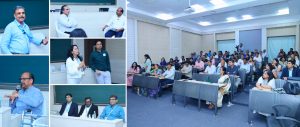
For the first time, the event hosted four concurrent breakout sessions, allowing attendees to engage with specific themes: AI and GenAI, sustainability, healthcare innovation, and grassroots impact. Alongside these sessions, participants were invited to explore lab tours, research showcases, and tech exhibits designed to spark dialogue and inspire partnership.
Below is a summary of each session and the key participants who led these important conversations:
Session: AI/ML, Cyber Security, GenAI:
Research Showcase: Sunita Sarawagi | Kameswari Chebrolu
Fireside Chat: Sunita Sarawagi | Sharad Sanghi
Panel Discussion featuring: Siddharth Sureka | Vineet Malhotra | Kiran Shesh | Dr. Khushaal Popli I Moderator: Ravindra Gudi
Session: Sustainability: Carbon capture, Clean Technology, Alternate Fuels:
Research Showcase: Vikram Vishal | Pratibha Sharma
Fireside Chat: Romit Sen | Chandramouli Subramaniam
Panel Discussion featuring: Wazeem Nishad | Romit Sen | Amit Paithankar I
Moderator: Ravishankar Gedela
Session: Healthcare: Affordable Healthcare and Bio Breakthroughs in Chronic Diseases and Digital
Healthcare, Biomedical Devices Point Of Care
Research Showcase: Samir K Maji | Ranjith Padinhateeri
Fireside Chat: Surabhi Goel | Ranjith Padinhateeri
Panel Discussion featuring: Vishal Warke | Ashutosh Kumar | Dr Akhilesh Sharma I
Moderator: Jayesh Bellare
Session: The Last Mile First: Innovation for Societal Impact
Research Showcase: Chandramouli Subramaniam | Parmeshwar D. Udmale
Fireside Chat: Atul Choudhari | Prakash Nanthagopalan
Panel Discussion featuring: Akshatha Narayana | Naveen Gautam | Milind Rane I
Moderator: Dnyanada Deshpande
Lab Tours, Research Showcases, Tech Exhibits
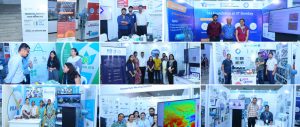
Attendees were invited to explore lab tours, research showcases, and tech exhibits designed to spark dialogue and inspire partnership.
Felicitation Ceremony for Recognising CSR Champions
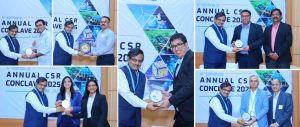
In a celebratory segment, the Institute honoured leading corporate contributors through a Felicitation Ceremony for Recognising CSR Champions.
These included the Motilal Oswal Foundation, ICICI Foundation, ABB India, Indus Towers, Autodesk, Tata Consulting Engineers, Waaree Energies Ltd., and many more whose support has enabled transformative work, ranging from setting up Centres of Excellence and endowing Chair Professorships to enhancing infrastructure and enabling student scholarships.
Launch of the CSR Conclave 2025 App

This spirit of innovation and inclusivity extended beyond the themes of the Conclave to how it was experienced by attendees. In the lead-up to the event, IIT Bombay rolled out a dedicated mobile app for the Conclave. Designed to enhance both pre-event planning and real-time engagement, the app allowed participants, particularly corporate partners, to log in several days in advance, view detailed schedules, explore speaker bios, and curate personalised itineraries. On the day of the Conclave, the app offered real-time updates and seamless access to session information, underscoring IIT Bombay’s commitment to thoughtful, tech-enabled engagement.
**********
As the day drew to a close, the message was clear: CSR is no longer a secondary activity. It is central to India’s development story, and IIT Bombay is ready to take that story forward. With its research depth, student talent, and growing network of partners, the Institute continues to align itself with the vision of Viksit Bharat@2047. IIT Bombay’s CSR Conclave 2025 offered a timely reminder that progress is not inevitable. It is built, deliberately and together. And when academia, industry, and civil society converge with shared purpose, India won’t just catch up, it will lead.

